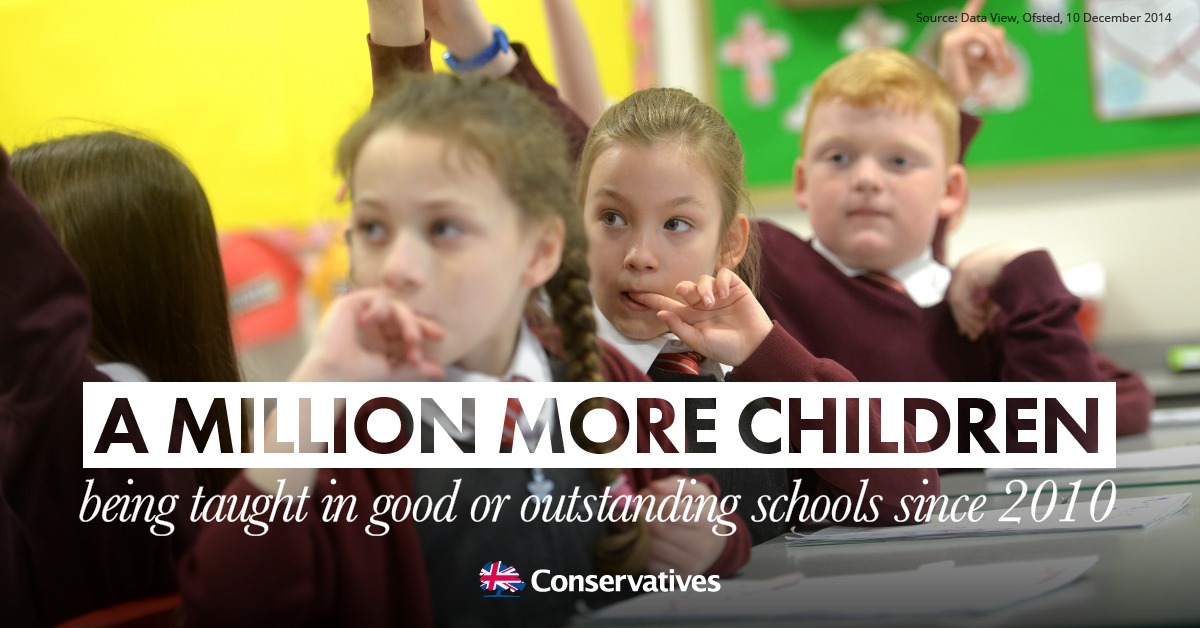While out campaigning I've been asked about the Conservative's plans for education so I will outline them here.
The Conservative Party believes in investing in our schools and improving education so that our children have every opportunity to succeed.
Conservatives in government have worked to increase teachers’ autonomy in the classroom, restored discipline and established a network of teaching schools to provide high-quality training and development to new and experienced teachers. It is right that we put professionals in the driving seat over what they teach, when they teach it, as well as who is best to teach it.
Over the next five years we want to build on our record of success and ensure that every young person leaves school prepared and ready to succeed in modern Britain. We are committed to spending £590 million more on schools compared to Labour over the next five years. We’ll do this by protecting the money that schools receive for every individual child they teach and guarantee that as pupil numbers rise, so too will the amount of money that schools receive.
Making sure there is a good local school place for every child in England is a key part of the Conservative’s long-term plan for education. Since 2010 we have made significant progress towards fairer funding for schools and have invested more than £5 billion to create more than 445,000 new school places across the country. We have announced that we will invest an additional £7 billion in new school places between 2015 and 2021 and will ensure that there is a good primary school place for every child.
The quality of new teachers has never been higher, with record levels of top graduates becoming teachers. Driven by more rigorous selection, quadrupling the Teach First scheme and recruiting teachers who have worked in other professions, 73 per cent of graduates starting teacher training have a 2:1 degree or better, the highest proportion ever.
We have reduced regulatory and administrative burdens on teachers and schools. The Workload Challenge survey identified the root causes of unnecessary teacher workload and, as a result, we have made it easier for teachers to learn from other schools, increased the opportunities available for coaching and mentoring and stopped changes being made during an academic year.
Free schools and academies are a critical part of our vision for education. We’re letting parents, teachers and social entrepreneurs open new schools – boosting choice for parents and helping drive up standards across the board. Academies and free schools are freed of council control, with power handed over to teachers so that the people who know them best can respond to individual pupils’ needs. They are performing better than council-run schools and are popular with parents.
It is right that state schools are able to hire brilliant teachers who have not worked in state schools before and have not got Qualified Teacher Status (QTS). Headteachers can allow the people they feel are best qualified to teach their pupils – great linguists, computer scientists, engineers and other specialists to inspire their pupils. Currently 96 per cent of teachers have QTS and we expect the vast majority to retain this status, but this Government is not going to take freedoms away from schools.
We are restoring rigour to our national curriculum so that it once again enjoys the confidence of parents, pupils and employers. Our new rigorous GCSEs, A-Levels and TechBacc qualifications are helping young people gain the core academic subjects and 71 per cent more pupils are taking the key subjects that they need to get a job or go to university.
We remain committed to ending child poverty by 2020. The Child Poverty Act 2010 received cross-party support and enshrined the child poverty target in legislation. We believe that there is a need for a revised set of child poverty measures that better reflect the evidence about the underlying causes of poverty. In June 2014 we published our second Child Poverty Strategy which sets out measures to tackle the root causes of child poverty by supporting families into work and increasing their earnings, improving living standards and raising the educational outcomes of poorer children.

